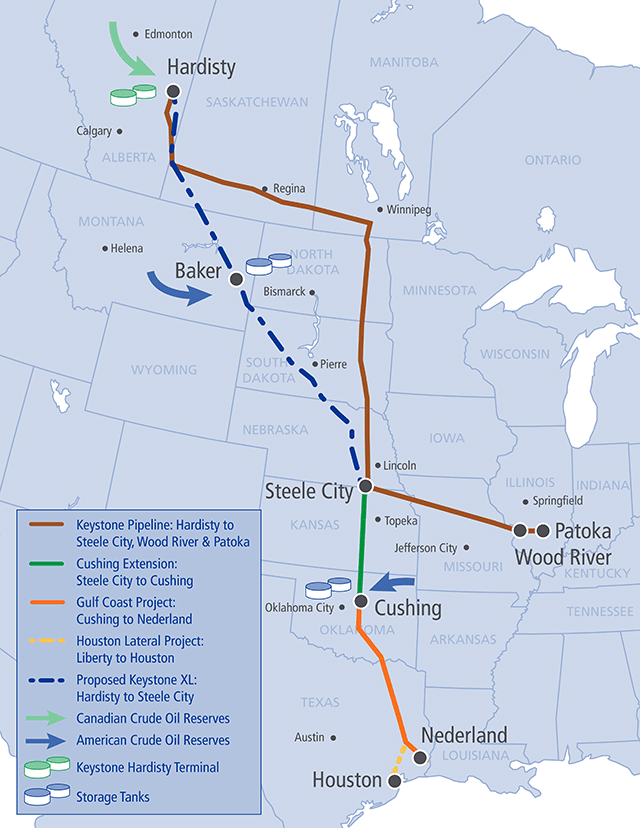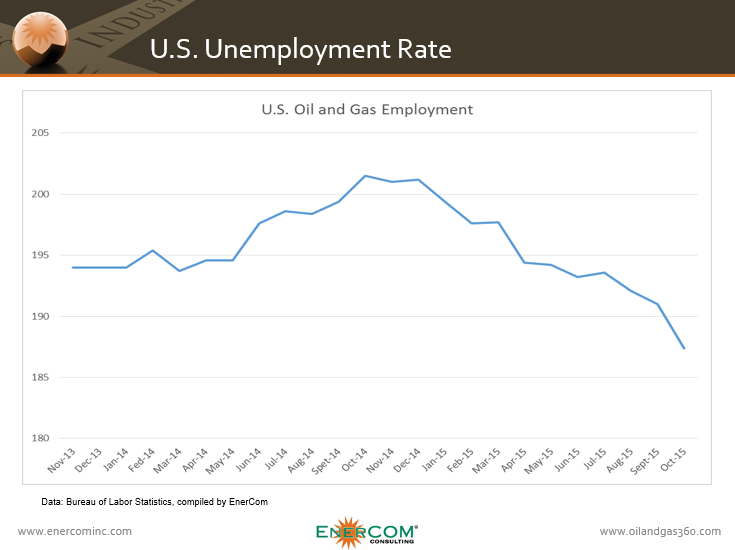After seven years of regulatory limbo, Obama administration says “no” to TransCanada application
President Obama announced today that he has rejected TransCanada’s (ticker: TRP) Keystone XL pipeline project after seven years of regulatory holdup. The decision comes as the president makes steps to solidify his environmental legacy during his final year in office. The 1,179-mile pipeline would have carried 800,000 barrels of crude from Canada’s oil sands from Hardisty, Alberta, to Steele City, Nebraska, where it would have been transported further to the Gulf Coast.
The Keystone XL pipeline became a political symbol amid a broader battle over environmental regulations. President Obama said that he would not approve the pipeline if it was found to negatively affect the environment. Even though the State Department’s study concluded that the Keystone XL project would not cause serious adverse effects to the environment, politics powered the decision to turn down the pipeline.
On Monday, TransCanada requested a pause in the review process of the pipeline while it awaited a decision from a Nebraska regulatory body, saying similar steps had been taken in the past. The State Department responded Wednesday that it would not pause the process, bringing the unusually long regulatory process surrounding the TransCanada application to build the Keystone XL to a head.
At a press conference given from the White House today, President Obama formally rejected the Keystone XL pipeline, saying that the arguments in favor of building the project – that it would create jobs and lower U.S. gasoline prices – were essentially moot, citing strong jobs numbers released today and citing lower gas prices nation-wide.
Jobs data released from the Bureau of Labor Statistics (BLS) showed the American economy created 271,000 jobs in the month of October, lowering unemployment by 0.1% to 5.0%. This comes in contrast to employment in the employment levels in the oil and gas industry, which were down another 1.92% month-over-month to 187,400, according to the BLS.
In rebuffing the argument that Keystone XL would lower gasoline prices, President Obama said that prices have already come down substantially, and that Keystone was not a necessary part of that process.
The president said that Keystone XL would not have substantially improved the U.S. economy in the way proponents claimed, and that it would not help in the transition to an energy economy that deemphasizes fossil fuels. “We must transition to a clean-energy economy,” Obama said during the White House press conference.
The decision to veto the Keystone XL project comes three weeks ahead of the 2015 United Nations Climate Change Conference in Paris. Obama hopes the U.S. will take a leading role in the development of global clean energy, and the timing of the decision to formally oppose Keystone might be viewed as a way of solidifying his position ahead of the UN Paris conference, set to take place November 30 – December 11.
Canadian investors: shift focus to an east-west pipeline across Canada to provide access for Canadian oil to reach all European and Asian markets; abandon the north-south pipeline concept
Some Canadian analysts and investment professionals have spoken out on BNN and other Canadian media, in the wake of today’s decision by Washington to reject the Keystone XL pipeline application. One theme that emerged from the point of view of a TransCanada institutional investor was to let Keystone go, and shift the focus to an east-west pipeline from Alberta to both coasts, giving access to multiple global markets, not staying locked tightly to one customer–the U.S. But other industry experts conjectured that the Keystone XL could come back to life under an energy-friendly new administration in Washington–if TransCanada wants to invest more time and capital in restarting the application process. One TransCanada investor said that the Keystone XL application should not be restarted unless the U.S. government requests the pipeline and is willing to pick up the tab for continued permitting costs for the pipeline.
TransCanada issues statement
TransCanada Corporation said it will review all of its options in light of a permit denial for Keystone XL. “Those options include filing a new application to receive a Presidential Permit for a cross border crude oil pipeline from Canada to the United States,” the company said via a press release.
“TransCanada and its shippers remain absolutely committed to building this important energy infrastructure project,” said Russ Girling, TransCanada’s president and chief executive officer. “We will review our options to potentially file a new application for border-crossing authority to ship our customer’s crude oil, and will now analyze the stated rationale for the denial.”
Girling pointed out that TransCanada continues to have the support of American and Canadian workers, labor organizations, industry and most of all, the American and Canadian people. He added with their continued support, the company believes that a pipeline will eventually be built as this is the safest, most economically efficient means of getting crude oil to market.
Other Canadian organizations weighed in. “While President Obama stated that the Keystone XL decision is not in the U.S. national interest, Canada’s oil and natural gas industry is clearly in the Canadian national interest,” Canadian Association of Petroleum Producers president and chief executive officer Tim McMillan said. “The Keystone XL pipeline deserved to be approved on the facts of its environmental, economic and energy security merits,” McMillan said. “Comprehensive US reviews found Keystone XL will cause no substantive change in global GHG emissions or other undue environmental impacts.”
Read an Oil & Gas 360® exclusive interview with TransCanada’s Keystone projects president Corey Goulet, entitled “What’s Next for Keystone XL,” here. The interview was conducted in March 2015.
Statement from Russ Girling, President and CEO, TransCanada
November 06, 2015 13:02 ET
TransCanada Media Advisory: Keystone XL Permit Denial Compromises Environment, Economy, Jobs and Public Safety in the U.S. and Canada
TransCanada Considering All Options Including Filing a New Application for a Presidential Permit
CALGARY, ALBERTA--(Marketwired - Nov. 6, 2015) - TransCanada Corporation (TSX:TRP) (NYSE:TRP) (TransCanada) today released the following statement from President and Chief Executive Officer Russ Girling following U.S. President Obama's denial of a Presidential Permit to build the Keystone XL pipeline:
We are disappointed with the President's decision to deny the Keystone XL application.
Today, misplaced symbolism was chosen over merit and science - rhetoric won out over reason.
The U.S. consumes over seven million barrels per day more oil than it produces and will continue to do so for decades, even despite U.S. oil production increases. It is disappointing the administration appears to have said yes to more oil imports from Iran and Venezuela over oil from Canada, the United States' strongest ally and trading partner, a country with rule of law and values consistent with the U.S.
Today's decision deals a damaging blow to jobs, the economy and the environment on both sides of the border.
Through the course of its review, the U.S. State Department issued five very comprehensive and balanced scientific reviews of Keystone XL since 2010. Tens of thousands of pages of evidence from its own employees and agencies irrefutably show Keystone XL is the safest, most environmentally sound way to transport needed energy to Americans.
These reviews further found that approval or denial of Keystone XL would be unlikely to significantly impact the rate of production in the oil sands, or the continued demand for heavy crude oil at refineries in the United States.
In addition, the State Department's review presented compelling evidence that clearly should have satisfied the President's stated test that Keystone XL would not significantly exacerbate greenhouse gas (GHG) emissions.
The State Department's January 31, 2014 Final Supplemental Environmental Impact Statement also concluded that the total annual GHG emissions transporting oil by rail to the Gulf Coast is about 42 percent greater compared to transporting that same oil through Keystone XL.
Today's decision cannot be reconciled with the conclusions of the State Department's comprehensive seven year review of the project.
Numerous independent studies have consistently concluded that the safest way to transport oil is in a modern, safe pipeline. Keystone XL would help replace the higher risk trucks, trains, barges and tankers currently carrying oil to market, and would provide the U.S. with energy supply security by connecting U.S. and Canadian producers to American refineries with a pipeline running four feet under the ground.
By dismissing the 9,000 jobs for Americans building Keystone XL as "only temporary", the administration has ignored the value of infrastructure jobs and has taken away work from those who seek it. In total, some 42,000 related jobs would not be created in the U.S. value chain as a result of this decision.
Counties and communities will no longer have access, annually, for the life of the project, to hundreds of millions of additional dollars in revenue generated from taxes paid by a company that has already injected almost $200 million in tax revenue into communities along the existing Keystone route.
In Canada, the U.S. denial impacts citizens across our nation at a time when jobs, economic stimulus and competitiveness are critical for the country.
This has been a shovel ready project in Canada since it was deemed to be in the public interest by the National Energy Board in March of 2010. Keystone XL would put 2,200 skilled Canadians to work almost overnight, with thousands more workers benefiting along the full value chain. Canadian manufacturers will lose out on millions more of spin-off activity that this US$8 billion privately-funded project would provide.
We are thankful for the support of American and Canadian workers, labor organizations, industry, our shippers and, most of all, Americans and Canadians.
TransCanada is reviewing the decision and its rationale. We believe KXL is in the best interest of the United States and Canada.
Russ Girling, President and CEO, TransCanada



